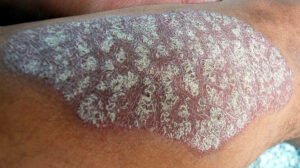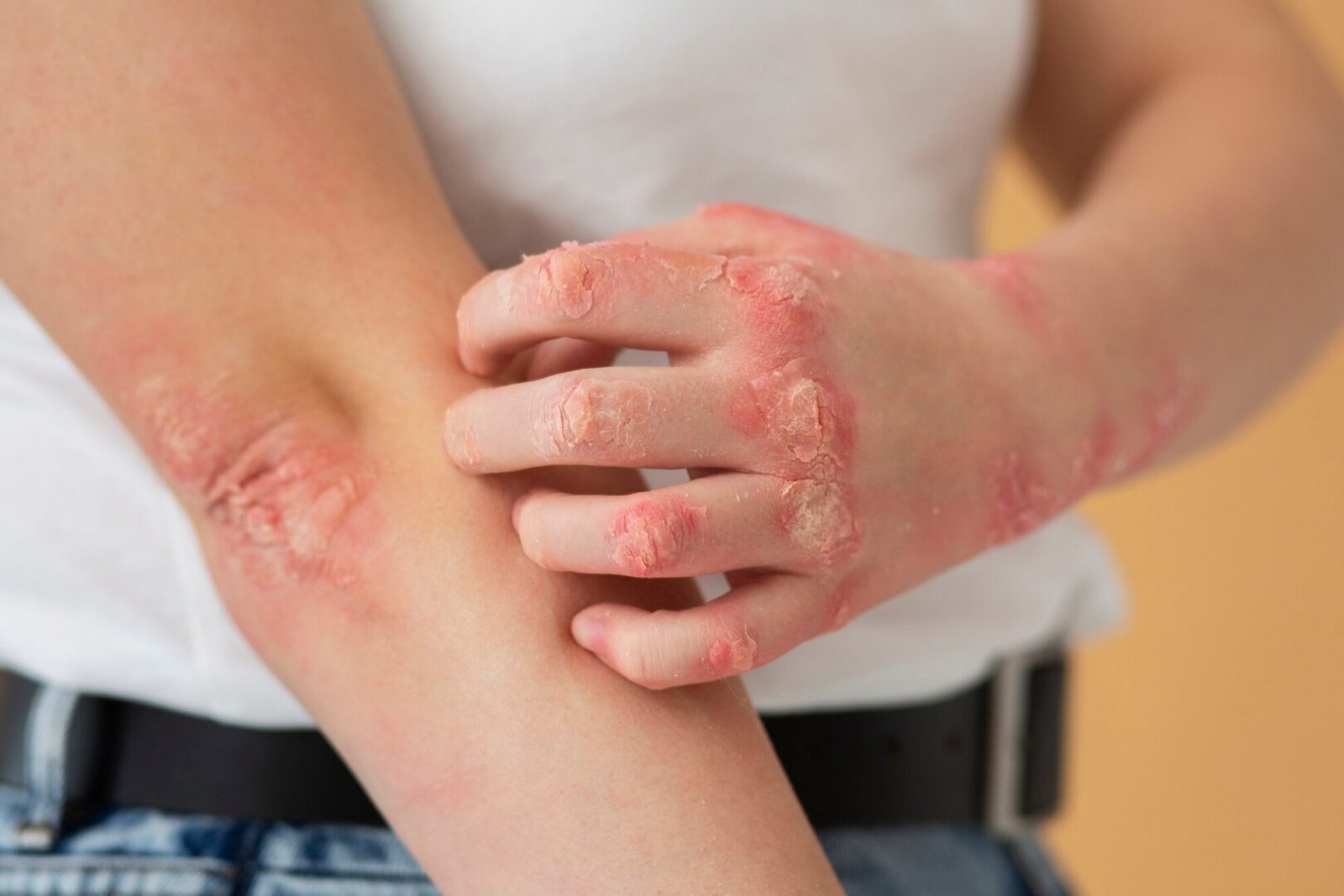The Keto Diet for Psoriasis Relief
The keto diet for psoriasis offers new hope and relief for those struggling with this chronic skin condition. Psoriasis often causes itchy, scaly patches that can drastically affect one’s quality of life.
While many conventional treatments focus on symptom management through medications, alternative approaches are gaining attention. The ketogenic diet, known for its low carbohydrate and high fat regimen, emerges as a compelling solution. This diet shifts your metabolic state from burning glucose to burning fats, leading to the production of ketones.
The ketogenic diet’s potential to manage autoimmune conditions like psoriasis stems from its impact on systemic inflammation. Reducing inflammation is key in managing the severity and persistence of psoriasis. The diet also focuses on cutting out processed sugars and high-carb foods, which can trigger psoriasis flare-ups.
In this article, we’ll learn how the ketogenic diet can help manage psoriasis and enhance overall well-being. We’ll cover scientific evidence, share real-life success stories, and offer practical tips for incorporating this diet into your lifestyle. If you’re seeking a natural way to manage your psoriasis, stay tuned. We’ll cover thoroughly how the keto diet can be a beneficial option for improving your skin health.
Understanding Psoriasis
Psoriasis is more than just a skin condition—it is a persistent autoimmune disorder that affects over 8 million people in the United States alone. This widespread prevalence highlights its impact on a significant portion of the population.
Psoriasis manifests as red, scaly patches that can cause considerable discomfort and affect a person’s self-esteem and daily activities. These patches typically appear on the knees, elbows, scalp, and trunk, and are not only itchy but often painful.
The exact cause of psoriasis is still not fully understood, but it is known that both genetic and environmental factors contribute to its development. Triggers can vary widely, ranging from stress and skin injuries to certain medications and infections. Once activated, managing psoriasis becomes a long-term challenge, with symptoms that can fluctuate over time.
Current treatments for psoriasis include topical ointments, phototherapy, and systemic medications. While these methods aim to reduce symptoms and manage flare-ups, they often come with side effects and may not lead to complete remission. As a result, many individuals explore alternative treatments in search of fewer adverse effects and more sustainable relief.
Among these alternative approaches, dietary changes are gaining recognition as a viable option. Modifying one’s diet can influence the body’s inflammatory processes, which are central to psoriasis. This understanding has spurred growing interest in the ketogenic diet as a potential way to manage psoriasis symptoms more naturally.

The Keto Diet Basics
The ketogenic diet is a nutritional strategy for psoriases, centered around high-fat, moderate-protein, and very low-carbohydrate intake. This regimen is increasingly considered for those exploring the keto diet for psoriasis management.
By significantly reducing carbohydrate consumption, the body is forced to enter a metabolic state known as ketosis. During ketosis, the body burns fat for energy instead of carbohydrates, leading to the production of molecules called ketones.
Here’s how the ketogenic diet works:
- Carbohydrates are limited to about 20 to 50 grams per day, depending on individual tolerance. This drastic reduction shifts your body’s primary energy source from glucose (derived from carbs) to fat.
- Fats become the mainstay of the diet, comprising up to 70-80% of daily caloric intake. Sources include butter, heavy cream, coconut oil, and other healthy fats.
- Protein is moderated to ensure that the body does not convert excess protein into glucose, which could disrupt ketosis.
Benefits Beyond Weight Loss
The benefits of this dietary approach extend beyond simple weight loss. By relying on fat for energy, your body sustains energy levels more steadily compared to the spikes and dips associated with a high-carb diet. This can lead to improved overall energy and better mental clarity.
For individuals with psoriasis, the reduction in carbohydrate intake can lead to lower systemic inflammation. Carbohydrates, especially refined sugars and starches, can trigger insulin spikes and contribute to inflammatory processes within the body. By limiting these, the diet may help reduce the inflammation that exacerbates psoriasis symptoms.
Additionally, the high fat content of the diet supports skin health. Fats are essential for cell membranes and can improve the hydration and resilience of the skin, which is beneficial for those with dry and irritated skin conditions like psoriasis.
In the next section, we’ll examine scientific studies that specifically look into how the ketogenic diet impacts psoriasis and why it offers a promising alternative to conventional treatments.

Scientific Evidence Supporting Keto for Psoriasis
Real-Life Success Story

One of the most compelling testimonials to the effectiveness of the ketogenic diet for psoriasis comes from Dr. David Fox, a general practitioner who personally battled with psoriasis. His journey offers valuable insights into how dietary changes can profoundly affect this condition.
Dr. Fox had been living with psoriasis since 2010, a condition that significantly impacted his life, particularly as visible patches appeared on his scalp, arms, and legs.
The constant discomfort and visible flaking were challenging to manage, and traditional treatments offered only temporary relief. However, his perspective on managing psoriasis changed dramatically after he adopted the ketogenic diet.
Initially, Dr. Fox was not seeking a solution for his psoriasis; his goal was simply to improve his overall health. He reduced his carbohydrate intake and increased his consumption of fats and proteins, aligning with the principles of the ketogenic diet. Remarkably, within just a month of following this diet, he noticed a significant reduction in inflammation and a gradual clearing of his psoriatic patches. After ten months, the psoriasis that had plagued him for years was completely resolved.
Transformation Beyond Skin Health
The benefits Dr. Fox experienced extended beyond just the improvement of his skin condition. He reported enhanced energy levels, better sleep quality, and an overall increase in well-being. These changes were so profound that they influenced his approach to patient care, prompting him to recommend low-carb and ketogenic diets to his patients suffering from similar inflammatory conditions.
Dr. Fox enthusiastically shares, “Eating keto and then low carb was my way of claiming back my health, and it became a major eye-opener to how diet could run the body’s inflammatory system.” His success illustrates the potential of the ketogenic diet to not only manage but possibly reverse chronic conditions like psoriasis.
“Eating keto and then low carb was my way of claiming back my health, and it became a major eye-opener to how diet could run the body’s inflammatory system.”
Educating Others on Dietary Changes
Encouraged by his results, Dr. Fox has become an advocate for dietary changes in the management of psoriasis and other chronic diseases. He has started support groups and educational sessions at his practice to help others achieve similar benefits through dietary adjustments.
Reflecting on his dietary journey, Dr. Fox remarks, “This is how I want to feel all the time.” His experience serves as a powerful example of how the ketogenic diet can offer a new avenue for those struggling with psoriasis, providing hope and a possible path toward lasting relief.

Key Takeaways
- Reduction in Inflammation: Studies indicate that the ketogenic diet can significantly reduce systemic inflammation, a key factor in psoriasis. By decreasing insulin release and shifting the body’s metabolism to fat, the diet helps to alleviate the inflammatory processes that exacerbate psoriasis.
- Improvement in Skin Health: The high fat content of the ketogenic diet supports better skin health. Healthy fats are crucial for maintaining the integrity of cell membranes and can improve skin hydration and resilience. This is particularly beneficial for those with dry and irritated skin conditions like psoriasis.
- Enhanced Overall Well-being: Beyond skin health, the ketogenic diet has been reported to boost overall energy levels and improve sleep quality. These benefits contribute to a better quality of life and may help individuals manage the stress that can trigger psoriasis flare-ups.
- Weight Management: The ketogenic diet is effective for weight loss, which can be particularly beneficial for psoriasis patients. Reducing body weight helps lessen the severity of psoriasis, as evidenced by improved PASI scores.
- Diet as a Complementary Therapy: While the ketogenic diet shows promise, it should be considered as part of a comprehensive treatment plan for psoriasis. Consulting with healthcare providers is crucial to ensure the diet is appropriately tailored and nutritionally balanced to meet individual health needs.
Final Thoughts
The keto diet for psoriasis, with its focus on high fats and low carbohydrates, offers a promising avenue for those seeking to reduce inflammation, enhance skin health, and achieve overall well-being.
For individuals struggling with psoriasis, the ketogenic diet might represent more than just a dietary change—it can be a transformative lifestyle shift.
If you or someone you know is battling psoriasis and interested in exploring dietary solutions, consider the ketogenic diet as a potential option. Begin by researching and understanding the diet thoroughly, perhaps starting with small, manageable changes and monitoring the effects on your symptoms.
For more resources or to join discussions on this topic, don’t hesitate to reach out to health forums, seek advice from dietitians specialized in autoimmune conditions, or consult dermatological experts. Together, you can chart a path toward better health and relief from psoriasis symptoms.
Take the first step today towards a healthier tomorrow. Your journey to managing psoriasis with the keto diet begins with one decision at a time, tailored to fit your life and your health goals.
References
- Impact of Ketogenic and Low-Glycemic Diets on Inflammatory Skin Conditions. Cutis
- Non-pharmacological Interventions for Psoriasis. Gulf Dermatology Journal
- Review of Integrative Medical Therapies for Psoriasis… Journal of Psoriasis and Psoriatic Arthritis
- The impact of use of a ketogenic diet for loss of weight and skin condition. Jagiellonian University Repository
- Psoriasis Statistics. National Psoriasis Foundation
Keto PowerFlax Baking Mix: Keto & So Much More!

- Commercial Bakeries: you can easily produce delicious flax-based keto-friendly products which are clean label, high protein, high fiber and plant-based!
- Works with your current equipment and baking processes.
- Recipes provided on all bulk orders, with ongoing customer support
- Worldwide shipping
- Get in touch with us today!

What to Read Next:
- Flax Seeds: Anti-Inflammatory Relief For Auto-Immune Conditions
- Flax Seeds For Arthritis Pain (Effective Relief)
- Flaxseed for Better Skin (Science-Backed Results)
- Is Keto an Anti-Aging Diet? What the Science Says
- The Keto Diet For Mental Health (Proven to Help!)



